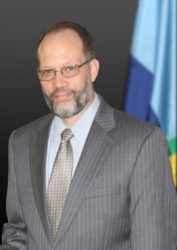In its 44th year, the Caribbean Community (Caricom) is working fairly well and making strides in areas its residents often take for granted, according to Caricom Secretary-General Ambassador Irwin LaRocque.
Speaking at a press briefing ahead of the 28th Inter-Sessional Meeting of Heads of Govern-ment of Caricom, to be held on Thursday and Friday in Guyana, LaRocque asked reporters to imagine the Caribbean without Caricom.

“Imagine if there were no Caricom. Things that we take for granted, that are part of our everyday lives, are Caricom at work. CXC [the Caribbean Examinations Council], which is itself 44 years old, that’s Caricom at work. The fact that more than 99% of our goods are traded freely, that’s Caricom at work. The fact that as a unit we can approach the European Union (EU) on correspondent banking, that’s Caricom at work. Imagine if Guyana or St Lucia had approached them alone? The fact that we have been able to successfully address HIV/AIDS collectively. The fact that we are the first region in the world to eradicate measles and we have a coordinated response in times of disaster and that we have been able to bring non-communicable disease to the attention of the international community,” he stressed.
He noted that while Caricom and the Caribbean Single Market and Economy (CSME) could have done more in the period they have existed, he was satisfied despite the frustrations he has faced.
LaRocque explained that this week’s meeting will address three broad areas of concern: economic development, crime and security, and international relations.
Noting that crime continues to pose a threat to the community, LaRocque stressed, “It is not just a national issue for individual member states, it’s a regional one and hence it demands a regional solution.”
The Heads of Government have committed attention to several pieces of legislation that are expected to greatly assist in addressing the problem.
These include a treaty for the establishment of a Caricom arrest warrant and a treaty to allow for the recovery of ill-gotten assets transferred to another jurisdiction.
“You can very well appreciate with free movement of persons and free movement of cargo and the like, transport of crime is something that needs to be addressed, so we are looking at what can be done at the regional level to address the issue at the national as well as the regional level,” he explained before noting that these the proposed laws have been given priority over six other measures, including a Witness Protection Treaty. Despite this focus, the two measures are not quite ready to be adopted by the Heads of Government Conference.
“Both of those instruments are being renegotiated simultaneously and both are in an advanced stage of deliberations [but] at this point in time we are not yet in a position to say that we are going to adopt this instrument at the sitting… Our hope was to have done that but I have to admit that some of the legal instruments require very careful examination,” the Secretary General said.
He explained that they are still to be approved by Caricom’s Legal Affairs Committee, after which a recommendation will be made to the Conference of Heads of Government on adoption.
In the area of economic development, Caricom heads will this week be presented with a review of the state of the CSME.
“One central issue is the CSME, which remains the best vehicle to promote economic growth and development and economic integration. Focus on that aspect of integration is key as our member states seek to maximise opportunities for growth,” LaRocque said, before explaining that the review of the CSME focused on several productive sectors, including tourism, agriculture, creative industries and Information Communication Technology (ICT).
Noting that ICT is not only a sector but also an enabler of development, LaRoque explained that the Secretariat is putting forward a roadmap for the development of a single ICT space in the Caribbean.
“A key element in creating a regional economy is a single ICT space …which will include regionally harmonised ICT policies, legislation, regulations, technical standards, best practices, networks and services. These will positively affect roaming rates and provide for a single area code, while addressing spectrum and broadband matters,” he explained.
In the area of international relations, the Heads will address border issues within the region, including the Guyana-Venezuela border and discuss how best to address issues of concern to the community with the Donald Trump administration.
An update as to international advocacy on the issue of correspondent banking will also be presented. LaRocque explained that Caricom has engaged the US, EU, the IMF and the World Bank on the issue. “In general, we have mounted an active advocacy initiative and brought to their attention the impact withdrawal of correspondent banking will have on some of our most basic bank transactions. Vital services, including remittance transfers, international trade, and the facilitation of credit card settlements for local clients, among other services, will be affected. We have been able to put it on their agenda,” he said, while noting that very few people were sensitised to the impact such an action would have on Caribbean and other small states.




